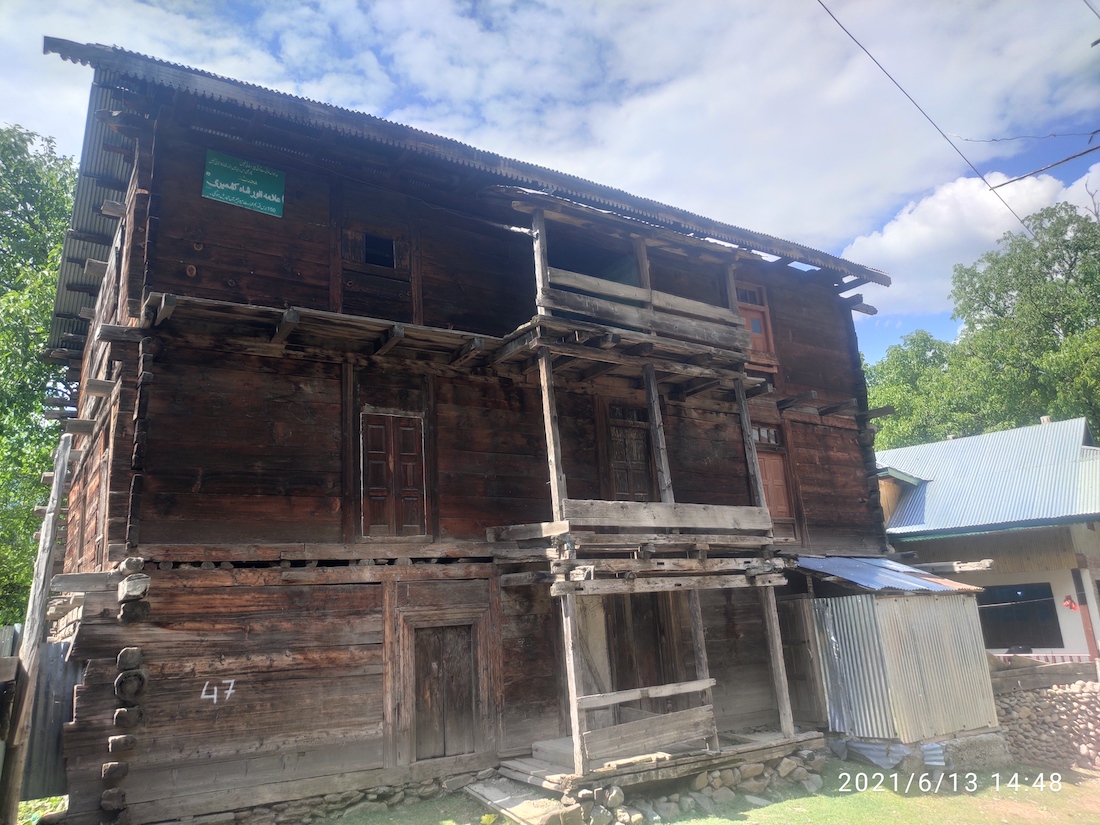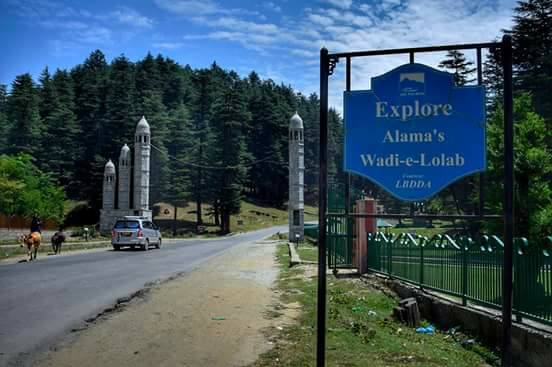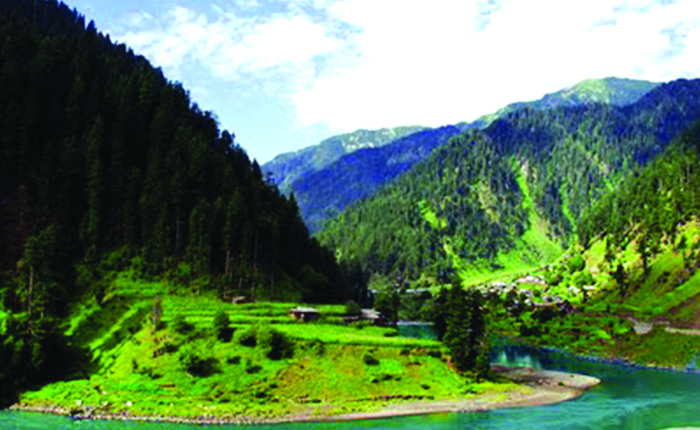One of the greatest Muhadith’s from Kashmir, Mawlana Anwar Shah Kashmiri was a poet and a great Islamic scholar, writes MJ Aslam

Mawlana Shah Mohammad Anwar popularly known as Mawlana Anwar Shah Kashmiri was born on Saturday, November 16, 1875 (Shawal, 18, 1292 AH) at Dudwan (Lolab). He was the son of Mawlana Muazam Ali Shah and the seventh-generation great-grandson of Baba [Amjad Sheikh] Masood Narwari or Narwari Sahib.
Migration From Srinagar
Baba Masood Narwari was originally a resident of Srinagar’s Narwara locality who had migrated to the Lolab valley (Kupwara) during the Mughal period of Kashmir. It may be noted that under the Census of 1911, a surname of Baba families [Qoom] of Kashmir was generally recorded as Baba as such but in the Census of 1931, Babas were generally recorded as Shah Families of Kashmir. Narwari falls in this category of the eminent Baba family, which was considered distinguished in learning and knowledge of Islamic sciences. Baba caste was generally used for men devoted to the service of the Muslim shrines of Kashmir.
Baba Masood Narwari was among a few rich elite people of the city, who lived in the time of famous Shia Sufi and scholar, Shams ud Din Iraqi. He had actually met him also in Iraq. It was, however, great Sufi saint, Mir Syed Ahmad Kirmani, who came to Kashmir during the reign of Sultan Nazuk Shah and whose Khanqah is located at Narwara Srinagar, who spiritually influenced and enlightened Baba Masood Narwari towards a spartan way of life.
Soon, Narwari gave up a rich comfortable life for the cause of acquiring and spreading religious knowledge. A devout follower of a renowned saint, Sheikh Hamza Makhdoom, he used to attend his spiritual gatherings.
An Early Learner
At the age of six only, Narwari’s great-grandson, Mawlana Anwar Shah Kashmiri, endowed with matchless zeal and memory, completed the reciting and learning of the Holy Quran under the guidance of his father, Mawlana Muazam Ali Shah. Molvi Abdul Jabbar and Molvi Ghulam Mohammad were famous Persian and Arabic scholars of the Lolab in that era. They taught and trained Mawlana Anwar Kashmiri initially in his tender childhood the basics of Arabic and Persian languages and grammar, and he completed learning some Persian books. His unbounded passion for the acquirement of knowledge compelled him to leave Lolab, and for three to four years, he attended the classes of different Sufis and scholars about metaphysics and theology in different Madrassas of Hazara Division (present-day Khyber Pakhtunkhwa in Pakistan).

In 1889 AD, when he was only 21 or 22 years of age, he relocated from Hazara to Darul Uloom Deoband, which was a key centre of learning of Islamic disciplines. Kashmir and Kashmiris for their overall educational and religious backwardness did not enjoy a good reputation among the educators of Deoband at that time but the extraordinary intelligence shown by young Anwar Shah attracted their attention and soon he was the favourite student at the Deoband seminary.
A Graduate
After completing his graduation in the Fiqah, Hadith and Tafseer in 1896 AD, he got Sanad [certificate] from the renowned scholar of Deoband, Mawlana Rasheed Ahmad Gangohi, for teaching the subject of Hadith sciences to the students at Deoband seminary. Besides, he earned his Khilafat and grace.
Under the guidance of Gangohi, he practised the sciences of Hadith at Gangohi madrassa. He also served for some time as Principal of famous Madrassa Amini at Delhi. In 1903 AD, he established a Madrassa, Faiz e Aam, at his native place, Lolab, and in 1905 AD, he proceeded on Hajj pilgrimage. By 1909 AD, he was back to Deoband.
Mawlana Anwar had mastered six authentic books of Hadith most of which he remembered on tip of his tongue as one of the most prolific scholars of Hadith sciences. He is credited with having contributed to the sciences of interpretation of Ahadith. He had a great passion for reading all treasures of knowledge and he was endowed by nature with incomparable memory so much so that he would quote passage after passage, line by line, with great ease during his lectures, delivering extempore, citing names of the books with accurate page numbers. Due to vast and excessive reading and power of photographic memory he was as though a moving and walking library.
His Mentor
Sheikh ul Hind, Mehmood ul Hassan was his mentor at Deoband seminary. The teacher had recognised his pupil and the pupil had recognised his teacher. He was among the famous and illustrious group of Ulema of Deoband who were prepared under the education benefaction of Sheikh ul Hind, Mehmood ul Hassan. He was so much impressed by his learning and teaching abilities and proficient memory that before leaving for Hajj in 1333 1915 AD, Mehmood ul Hassan nominated him as his successor and arranged for his permanent residence at Deoband with Mawlana Hafiz Mohammad Ahmad. He was Dean of Deoband for twelve years. He remained so much absorbed and engaged with his teaching assignments, for which he never demanded or accepted any salary, that at 44 he was still unmarried.

It was his spiritual mentor Sheikh ul Hind, Mehmood ul Hassan, the Dean at Deoband, who drew his attention towards the binding nature of the Holy Prophets’ Sunnah of Nikah and how could he say no to his teacher and deviate from it. Then, through the mediation of Mawlana Habib ur Rahman, a selfless teacher at Deoband, he was married to a lady in the highly religious Gangohi family of Deoband in 1918AD.
With marital responsibility on his head, it was at the insistence of the faculty of Deoband that after his marriage, he was compelled to accept very small amount of money as salary for teaching, at least for maintenance of the family. As long as he did not accept any salary for teaching till his Nikah, he lived as a guest of Deaband’s Mawlana Hafiz Mohammad Ahmad.
Resigned
Due to some dissenting views with some Ulema of Deoband, in 1927 AD, he, with some other Ulema resigned from Deoband and joined a Madrassa at Dabhel Gujarat, where he taught Hadith sciences till 1932 AD.
Mawlana had remarkable spiritual bondage with Dr Sir Mohammad Iqbal who wanted and invited him to Lahore in order to settle things with Ulema of Deoband without quitting the seminary. But he had already decided to take up further teaching at Dabhel Gujarat.
During his days at Deoband, he took extensive travels to different parts of undivided India and beyond. Once he was leading a delegation of Ambassadors of Deoband seminary to Dhaka where he delivered an illuminating speech in Arabic and Khawaja Sir Salim Bhadur, Nawab of Dhaka, who attended his address, was immensely impressed by his vast knowledge and conferred great honours on him. He visited Kahota, Gujranwala, Rawalpindi and Lahore, and delivered intensely rich sermons on multiple disciplines of Islamic jurisprudence. He was an Arabic and Persian poet also, besides a jurist-consult [Faqih] and Mohadith [an expert on Hadith]. He has written several Naats in Persian and Arabic.
A Home Visit
In 1923 AD, he visited second time after his departure from the Lolab to his native place to meet his father and four brothers. Earlier, he had visited when his mother had passed away. During his stay in Kashmir, he delivered several sermons to huge gatherings of people of the Lolab.
In the late 1920s, Syed Rasheed Raza, an acclaimed luminary of Jamia Al-Azhar of Egypt, visited Deoband seminary. Mawlana Anwar Shah Kashmiri in his address in Arabic succinctly explained the historical background of Deoband seminary and its operational teaching mechanism of varied subjects of Tafseer, Hadith, Fiqah, (jurisprudence, metaphysics and theology). He had Munazira [argumentation] on several matters of Shariah with an eminent Islamic scholar, Syed Rasheed Raza, which left the latter with an unforgettable impression about the depths of his knowledge on the sciences of Islam. Later, he admitted that his visit to India would have been incomplete if he had not met and seen Mawlana Anwar Shah Kashmiri. He acknowledged in his papers also at Al-Azhar University that Mawlana Anwar Shah Kashmiri was indeed endowed by Allah with “academic glory and greatness of dignity”. He said about Mawlana Anwar Shah Kashmiri: “I have never seen any religious divine like this glorious Professor.”
With Iqbal
Dr Sir Mohammad Iqbal’s great interest in Islamic teachings owed much to Mawlana Anwar Shah Kashmiri’s academic benevolence. Iqbal held him in great esteem as an outstanding scholar of Islam with no parallel in Islamic history during the nineteenth and twentieth century’s. He rendered the poet Iqbal a great help in the refutation of Ahmadiya doctrines in his papers.
As an authority on Hadith, Mawlana confronted Mirza Ghulam Ahmad Qadiyani and prevented through his extensive lectures and writings the spread of Qadiyani doctrines in the subcontinent. He won great laurels for his achievements and contribution in the field of Islamic sciences of knowledge from Mawlana Ashraf Ali Thanvi and Mawlana Shabir Ahmad Usmani, two eminent faces of the Islamic scholarship of the subcontinent at that time.
Though he had settled at Debhel Madrassa in Gujarat but Deoband was always his hometown. At Debhel, he was visited by ailments and ultimately on May 27, 1933 AD, he passed away at an early age of fifty-eight years. He lays buried in an orchard near Eidgah, Deoband.
















He was from varnav lolab kupwara not dudwan ,why are you giving this false and wrong information about him